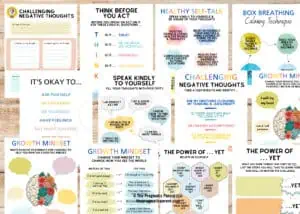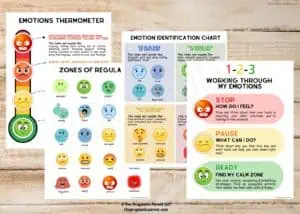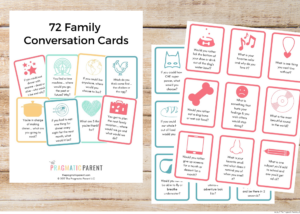Has your baby’s sleep been disrupted with night waking, extra fussiness, inconsolable crying and extreme hunger right at the 6 week mark? The first sleep regression your baby will go through in all of the sleep regression phases begins at 6 weeks, but so does the 6 week growth spurt. How to tell if this is the 6 Week Sleep Regression, the 6 Week Growth Spurt, or both!
Plus, your Survival Guide to every Sleep Regression now Through 2 Years Old.
6 Week Old is Suddenly Not Sleeping – Is it the 6 Week Sleep Regression or a 6 Week Growth Spurt, or Both?!?
You’ve been celebrating because your baby is finally sleeping for longer stretches, but then right around 6 weeks, you notice a sleep setback and aren’t sure what to do. Is it a sleep regression? Is it a growth spurt? How do you get back to that good track of sleep?
Right around 6 weeks, many parents notice their baby suddenly stops sleeping or has a hard time staying asleep, staying asleep and is more restless that normal. Typically around the 6 week mark, you may notice nap times have turned into more of a struggle, your baby wakes easily and isn’t sleeping as soundly, or nighttime sleep has turned into a complete wreck.
This first time a sleep setback happens, right when you’re getting the hang of sleep times and things seem to be shifting towards a good nap and nighttime routine, then suddenly, you feel like things are moving backwards when it comes to all things sleep can be difficult.
You’re already sleep deprived yourself, and desperate to get back on track.
Don’t worry Mama, let’s figure out why your 6 week old is suddenly not sleeping (for a newborn, of course.).
It could be the 6 week sleep regression, or it could be a big growth spurt happening right about this time.
While sleep disturbances don’t always mean your baby is experiencing a sleep regression, let’s first look at the signs of what a sleep regression typically looks like.
If You’re in a Hurry or Looking for Quick Sleep Regression Wins…
Signs Your Baby is Going Through the 6 Week Sleep Regression:
Tracking your baby’s sleep progress can feel like a full-time job for new Moms but you’ll have a good sense of when things get off track when you’re dialed into their nap and bedtime schedules and feeding habits. That’s why you’ll likely notice these typical signs of a sleep regression (or growth spurt, listed down below.)
Common signs your baby is going through a sleep regression:
- Uncharacteristic night waking
- Uptick in fussiness and crying for extended lengths of time
- Extreme crankiness
- Changes in hunger (eating less or eating more)
- Trouble with naps (missing naps all together, difficulty going to sleep or shortening them on their own)
- Clinginess and needing to be comforted by Mom or Dad more often (extra cuddles and being held)
Sleep regression phases typically appear around these ages:
- 4 months (read about the 4 month sleep regression)
- 8-10 months (read about the 8-10 month sleep regression)
- 12 months
- 18 months (read about the 18 month sleep regression)
- 2 year old (read about the 2 year old sleep regression)
Signs Your Baby is Hitting a 6 Week Growth Spurt:
You may be thinking, “Yes! my baby checked all those signs of a sleep regression… that must be what it is!”
BUT…. Around the 6 week mark, your baby is also going through a major growth spurt and while they may check all the boxes of a sleep regression, you have to consider this phase of rapid development, too.
According to the book, The Wonder Weeks, growth spurts occur at weeks 5, 8, 12, 19, 26, 37, 46 and 55 – that’s a whole lot of growth spurts!
- Fussier than usual
- Extreme crankiness
- Increased hunger and feedings
- Baby wants to be held more often
Why do Babies Go Through a Growth Spurt at 6 Weeks?
Around six weeks of age, babies begin to transition out of the drowsy and dreamy newborn state, and begin notice the world around them.
All the new awareness perks a baby up but with so many sights, sounds, and awareness going on, this can also be overwhelming to your 6-week-old but can also tire them out – cause an overtired and extra fussy baby – as they observe and take all the new experiences in.
Which One Is It – a Sleep Regression or Growth Spurt?
Actually, your baby could be going through both (yes, at the same time!)
If you notice your 6-week-old begin to struggle with sleep and checks the boxes of both a sleep regression and growth spurt, and you’ve eliminated any source of discomfort or illness, you may be experiencing this double whammy: the 6 week sleep regression and 6 week growth spurt at the same time.
Double Whammy: 6 Week Sleep Regression & Growth Spurt at the Same Time
It’s important to remember a growth spurt will normalize again soon (usually 2-3 days but as much as 1 week at this age) and your baby will return to sleeping soon after this rapid development phase has finished and there is nothing you can do but make sure your baby is getting sleep (even if it’s in short pockets of it), and nutrition to move through this time.
When it comes to sleep regressions, most of these sleepless phases last 2 – 4 weeks (anything longer than this is a bigger issue), but the 6 week sleep regression is typically the shortest of all sleep regression, and may be over the phase in about one weeks’ time.
Your baby is leaning on you for comfort during this exhausting time.
She may be hungry and also wanting to feed for extra soothing, and is fighting sleep to eat or receive comfort, but the best thing you can do is stick to your routine, comfort her how she needs without creating negative sleep associations (rocking her to sleep, nursing to sleep) which can undo all your work to this 6 week stretch.
Tips to Help You Survive the 6 Week Growth Spurt & Sleep Regression:
- Know a sleep regression and growth spurt are temporary and will not last forever. You may have to adjust your schedule a little, but things will normalize soon. The best thing you can do is be consistent and don’t start changing your routine.
- Expose your baby to natural light (especially in the morning and at the end of the day) and let the body’s natural circadian rhythm do it’s job and soothe your baby to sleep.
- Try soothing equipment such as a swing, getting outside for a walk in the stroller for movement to soothe him to sleep, and a baby carrier with skin-to-skin contact so you can have your hands free.
- Additional feeding are temporary; if breastfeeding too often becomes painful, look to other feeding solutions like using a bottle and asking your partner for help.
- Help you baby relax before nap times and bedtimes with a warm bath, a gentle baby massage, dimly lit room, swaddle and white noise machine.
- Try moving your baby’s bedtime earlier to help accommodate the extra tiredness they’ll experience. Remember, putting baby to bed later than normal or after the point of being overtired does not mean they will settle to sleep easy – in fact, it’s the opposite. The more overtired a baby is, the more they’ll fight sleep and be more restless during the night.
- Be cautious with how you help your baby; try not to create any sleep associations that will hurt sleep habits in the long run. (rocking our baby to sleep or nursing your baby to sleep instead of placing them drowsy in their crib are sleep crutches that are harder to break down the road.)
Additional Resources for Helping You During Sleep Regressions:
Surviving Your Child’s Sleep Regressions Ebook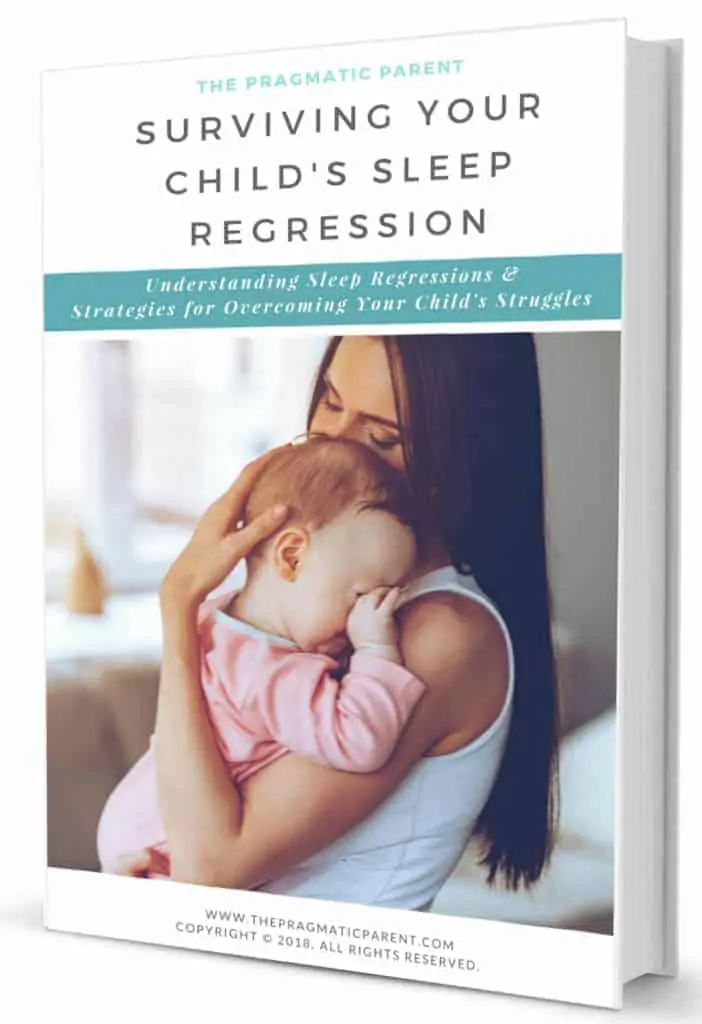
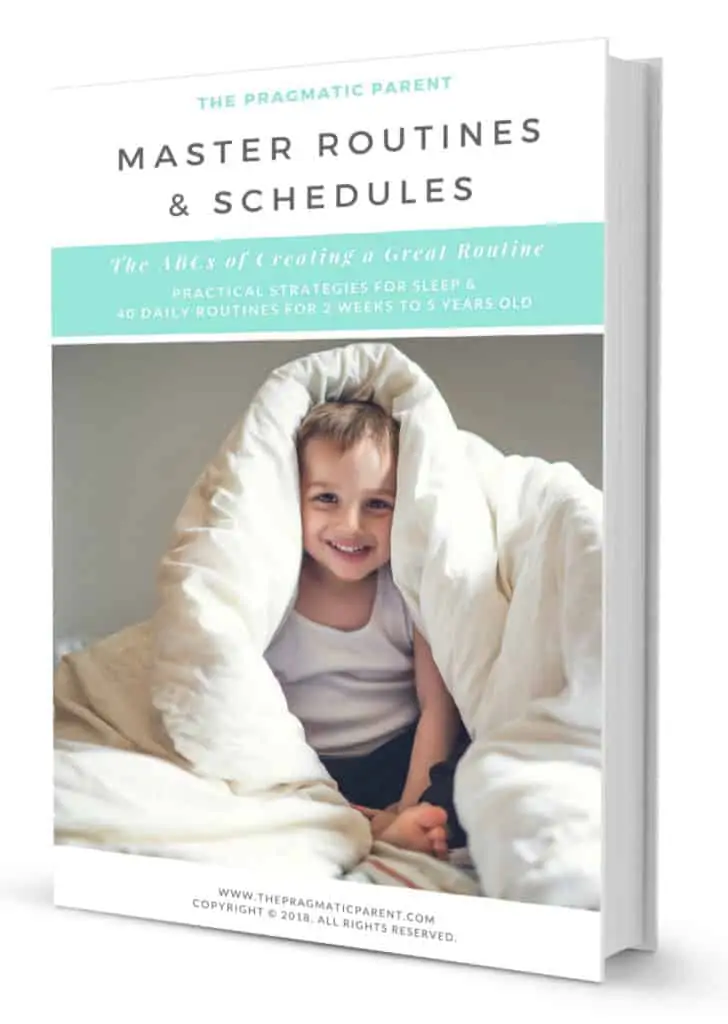
Learn how to start the process of creating a routine, establishing wake up and bedtimes, strategies for working through nap transitions, prepping for daylight savings time to keep your routine on track and logging your baby’s sleep patterns to rocking a solid schedule through every age of growth.
More Sleep Regression Articles & Sleep Tips:
- Sleep Regressions: What You Need to Know to Survive Them
- Overcome the Dreaded 4 Month Sleep Regression: Navigate This Tricky Stage
- What to Do When Baby Won’t Nap: 8 Things to Try When Baby Won’t Go to Sleep
- 9 Signs of a Tired Baby: Reading Baby’s Cues Sleep is Near
- 11 Baby Sleep Tips to Help Your Newborn Baby Sleep
- Gently Teach Your Baby How to Sleep Through The Night
- Surviving The (Dreaded) 8-10 Month Sleep Regression



